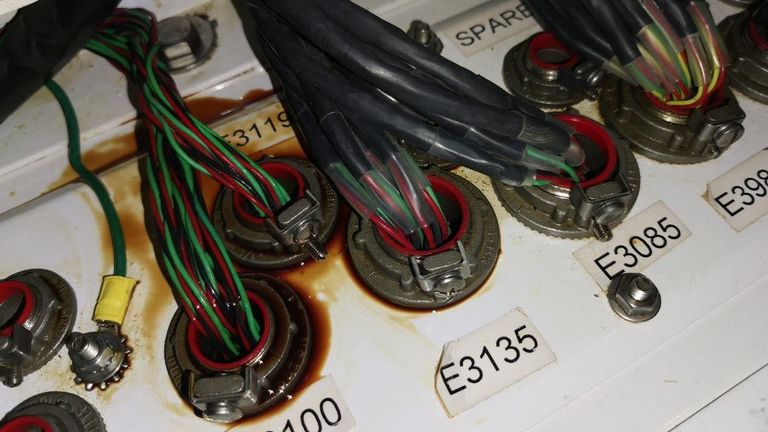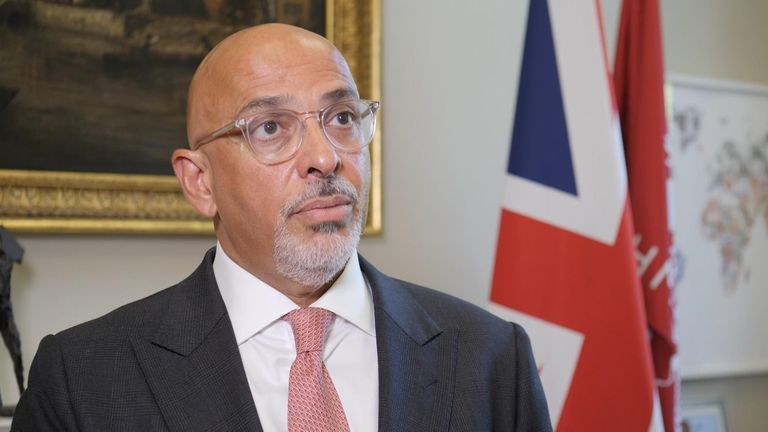Russia’s Gazprom has said natural gas supplies to Europe via the Nord Stream 1 pipeline will remain shut off.
It comes after G7 finance ministers agreed to impose a price cap on Russian oil exports in an effort to limit funding for President Vladimir Putin’s war in Ukraine.
Gazprom said it was not reinstating supplies to Europe because the main gas turbine at Portovaya compressor station near St Petersburg could not operate safely until a leak was repaired. It did not say when supplies would be restarted.
Westminster rocked by ‘horrific’ fresh sexual assault allegations – Politics Hub
Moscow has blamed sanctions imposed by the West after Russia invaded Ukraine for hampering routine operations and maintenance for Nord Stream 1. However, Brussels has said that is a pretext and Russia is using gas as an economic weapon to retaliate.
President of the European Council Charles Michel tweeted: “Gazprom’s move is sadly no surprise. Use of gas as a weapon will not change the resolve of the EU.
“We will accelerate our path towards energy independence. Our duty is to protect our citizens and support the freedom of #Ukraine @ZelenskyyUa”
The European Commission’s chief spokesperson, Eric Mamer, tweeted: “Gazprom’s announcement this afternoon that it is once again shutting down North Stream 1 under fallacious pretences is another confirmation of its unreliability as a supplier.
“It’s also proof of Russia’s cynicism, as it prefers to flare gas instead of honouring contracts.”
Germany’s network regulator said the country was better prepared for a stop of Russian gas supplies, but urged citizens and companies to cut consumption.
“In view of the Russian decision not to allow any gas to flow via Nord Stream 1 for the time being, the LNG terminals,
the relevant storage levels & significant savings requirements are becoming more important,” Klaus Mueller, president of the Bundesnetzagentur, tweeted. “It’s good that Germany is now better prepared, but now it’s down to each and everyone.”
The G7 decision was made at a virtual meeting of the group, made up of seven of the world’s richest countries – the UK, US, Canada, Italy, France, Germany and Japan – on Friday afternoon.
Confirming the news, Chancellor Nadhim Zahawi said: “We will curtail Putin’s capacity to fund his war from oil exports by banning services, such as insurance and the provision of finance, to vessels carrying Russian oil above an agreed price cap.”
The price cap has not yet been decided.
Ukrainian President Volodymyr Zelenskyy said: “It is long overdue for such energy sanctions against Russia. The sanctions that will not only limit the flow of petrodollars and gas euros to Moscow, but also, importantly, restore justice for all Europeans, whom Russia is trying to blackmail with artificially inflated prices on the energy market.”
A statement from the G7 finance ministers said it would be set by the full coalition before it is implemented in each country.
Despite selling less oil since the invasion of Ukraine in February, Russia made £600m more from oil sales in June than it did in the previous month because of rocketing prices pushed up by the war.
As well as limiting Russia’s revenues, it is hoped the price cap can also bring down rising energy prices around the world.
Speaking after the announcement, Mr Zahawi said the move will “protect our citizens from oil price shocks next year”.
He added: “That is a significant step forward.
“It will mean that Putin can’t profiteer from excessively high oil prices and of course, protect all of us from oil price shocks next year and beyond.”
‘Putin’s strategy will not work’
The G7 decision comes after Mr Zahawi met with Treasury Secretary Janet Yellen in Washington on Wednesday for talks on how to tackle the spiralling cost of living crisis.
Sky News understands that the meeting was important in getting the two countries in lockstep over the price cap.
Mr Zahawi said G7 ministers would be discussing strategies to implement the cap in December, then putting it in place in February.
Energy bills will soar for millions of UK households before then, after Ofgem hiked up its October price cap by 80% – plunging many into financial hardship.
Read more:
Zahawi prepares multibillion-pound tax cuts for businesses weathering energy crisis
Who is proposing what to tackle soaring energy bills?
Mr Zahawi acknowledged people need help sooner than when the cap on Russian oil comes in to effect.
He said he was “very concerned of the scarring effect on businesses” and that the government is “working up options” so the next prime minister, who will be named on Monday, can “hit the ground running to be able to offer additional help in January and through to next year.”
Mr Zahawi added: “Putin has to know that this strategy is not going to work. He thinks that actually using energy as a tool to get back at us will work… It’s not going to work.
“And actually, today’s G7 is another reminder to him why we’re going to coordinate and we’re going to deal with these energy price shocks collectively and will continue to help Ukraine reclaim their country.”



